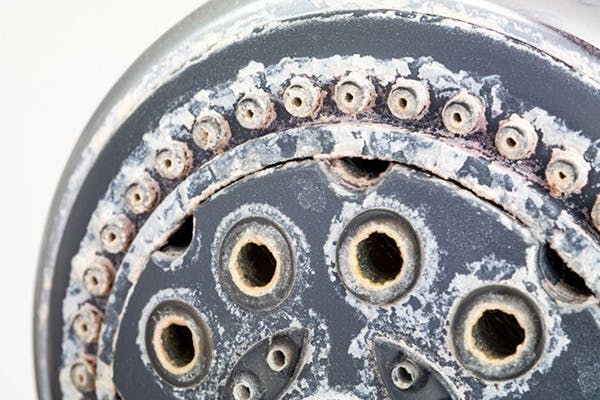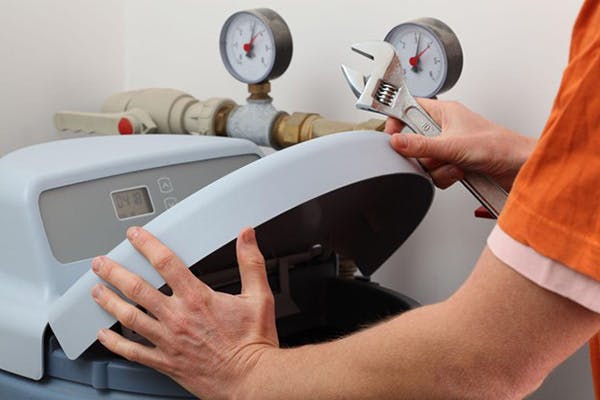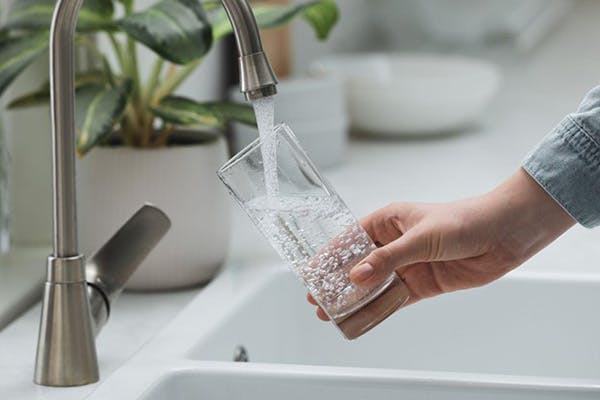November 2022
Water Softener vs. Salt-Free Water Conditioner: Which Is Right for Your Home?
Pure, clean water is something we all expect when we turn on our home tap. Unfortunately, that’s not always what we get. Sometimes our water has contaminants like heavy metals, PFAs, bacteria, and viruses that we need to filter out to protect our health. In about 90% of U.S. homes, tap water also contains high levels of dissolved minerals, damaging our pipes and appliances. We call this hard water.
Before we break down what your options are, including the water softener vs. salt-free water conditioner details, let’s take a moment to learn why you have hard water in the first place.
Why Do We Have Hard Water?
Most tap water starts out as groundwater. The natural materials like rocks and soil in the ground act as a natural filter. As the water passes over the rocks, it dissolves some mineral solids and carries them along for the ride. This is a natural process that fills the water with healthy minerals. It is also part of what makes spring water so coveted for taste and health.
While these natural minerals in our drinking water can be beneficial to the health of people and animals, they’re not as kind to our pipes and water-using appliances. Hard water can be quite damaging in our modern homes.
What Problems Can Hard Water Cause?
The effects of hard water aren’t just damaging to our pipes and appliances — the calcium and magnesium in it can cause scale buildup, which can breed bacteria and mold.
These hard water minerals also:
- Corrode pipes
- Clog showers, faucets, and drains
- Strain appliances like dishwashers and washing machines, making them less energy efficient
- Increase the amount of soap needed for laundry, dishes, and lathering
- Leave sediment and soap scum on surfaces like tiles and glassware
- Make cleaning take longer
- Damage the fibers in your clothing
- Dry out your skin and hair
Magnesium intake may even cause diarrhea at very high levels.
As you can see, hard water creates many problems we aim to help you solve.
How Do I Know If I Have Hard Water?
Water hardness is measured in grains per U.S. gallon (gpg).
0–3.5 gpg is considered soft water.
3.5–7 gpg is considered medium water.
7–10.5 gpg is considered hard water.
>10.5 gpg is considered very hard water.
If you pay a water bill, the easiest way to determine the hardness of your water is just to ask. Your local water company should have all the information about your water and its source. You can also purchase at home water tests that will give you immediate results.
If you use a private well for water, it’s not quite so easy since your water is mostly your responsibility. Look at the Environmental Protection Agency’s website for more about testing your water.
Are Water Softeners the Solution?
Many people believe salt-based water softeners are the only solution to hard water. While we agree that water softeners can work miracles in our homes, these systems have their drawbacks and aren’t the best solution for everyone. In some areas of the U.S., salt-based water softeners aren’t even legal due to the byproducts they release back into the water supply.
For this reason, we want to introduce you to a lesser-known option — the salt-free water conditioner (also known as a descaler) — which might be a better option for you.
Let’s look closer at the water softener vs. salt-free water conditioner question to understand what exactly each of these are and to determine if a salt-free water conditioner is the right solution for your hard water problems.
To figure out the differences, we need to first go over what traditional water softeners are and how they work.
How Do Water Softeners Work?
Most water softeners are known as salt-based water softeners because they need salt to make them work.
When water travels through a water softener, it first passes through a tank full of resin beads made of polystyrene. These resin beads attract the calcium and magnesium ions from the water and soften it.
When the water softener is paired with a quality water filtration system, the mineral content is removed, leaving you with pure, delicious water that makes cleaning a breeze and leaves your skin looking radiant.
As more water passes through the water softening system, the resin beads become saturated to the point that they can no longer pull minerals from the water. To make them functional again, the resin beads need to go through a regeneration phase.
To regenerate, a second tank releases salt brine into the tank with the resin beads and an ion exchange occurs. The beads exchange the waste calcium and magnesium ions for the sodium ions, which renews them. The salt brine — now full of salt and hard water minerals — is dumped as wastewater, while the recharged resin beads can go back to giving you softened water.
Your home water will now flow freely through your water lines without leaving mineral buildup and scale deposits in your poor coffee machine or struggling water heater.
Water Softener vs. Salt-Free Water Conditioner: What’s the Difference?
Now that we know the basics of how water softeners work, we can better understand what makes a salt-free water conditioner different.
Salt-free water conditioners, sometimes referred to as de-scalers, get their name because they remove mineral scale buildup on surfaces and prevent it from forming. Unlike water softeners, salt-free water conditioners don’t actually lower water hardness levels in your water. Instead, they alter the structure of the minerals so they don’t cause the same issues to your pipes and surfaces as untreated hard water.
What Do Salt-Free Water Conditioners Do?
Salt-free water conditioners treat hard water by changing how the hard water minerals are structured. There are many types of salt-free water conditioners. They all have different ways of getting the same result. Some salt-free water conditioners use an electric or magnetic field to alter the minerals so they no longer stick to surfaces. Others, like the Template Assisted Crystallization (TAC) salt-free water conditioners, attract the minerals onto a resin surface where they crystallize before being released back into the water. These new crystalized structures don’t stick in your pipes and so they don’t cause scale buildup.
What Are Some of the Benefits of Using a Salt-Free Water Conditioner vs. Water Softener?
We love the water softeners we make and believe they are a great solution for many people dealing with hard water problems. With that said, we also know that sometimes salt-free water conditioners are a better option for some of our customers.
Here are seven questions to think about that may lead you to choose a salt-free water conditioner over a water softener:
1. How Do Water Softeners Compare in Price to Salt-Free Water Conditioners?
In the battle of water softener vs. salt-free water conditioner, the price will always be a factor. Water softeners are usually large, smart systems that are constantly tracking your water usage to understand when they need to self-regenerate. While they provide a lot of value, they are pricey to buy and usually require a professional plumber to install them. All of this can add up to a large bill for the homeowner.
Salt-free water conditioners are smaller, cheaper, and easier to install than water softeners. While water softeners can cost you thousands of dollars, salt-free water conditioners can be in the hundreds.
2. Are Water Softeners or Salt-Free Water Conditioners Easier to Install?
Salt-free water conditioners are usually much easier to install than water softeners. They are smaller systems that can sometimes even just hook into your existing home filtration system. Many people opt to install a salt-free water conditioner themself and save money rather than hiring a plumber.
3. Water Softener vs. Salt-Free Water Conditioner: Which Requires More Maintenance?
Water softeners require you to buy large bags of salt so you can refill the brine tanks often. They also need their filter replaced or cleaned so they keep working as you’d expect. While this isn’t especially intense work, raise your hand if you need more chores in your life.
Salt-free water conditioners are light on maintenance. There is no salt to replace. They are pretty much “Set it and forget it.”
4. Which Makes for the Healthiest Drinking Water — Salt-Free Water Conditioners or Water Softeners?
While it’s not enough salt to alter the taste of your water, salt-based water softeners will add a very small amount to your daily sodium intake. Excessive sodium is known to increase blood pressure in some people, so you might consider this if someone in your household is very sensitive to sodium.
Meanwhile, the calcium and the magnesium in hard water actually have many health benefits, including for your digestive and cardiovascular systems. Because salt-free water conditioners don’t remove healthy minerals from your drinking water, there’s a definite argument that could be made for salt-free water conditioners here.
5. Water Softeners vs. Salt-Free Water Conditioners: Which Makes for a Better Tasting Glass of Water?
This one isn’t so simple since taste is subjective. Hard water is really just mineral water. This is the same mineral water that gets celebrated for its great taste in springs and expensive bottled waters.
But that doesn’t mean it’s everyone’s favorite. Minerals change the taste of water, and for some people, the change isn’t welcome.
6. Are Water Softeners or Salt-Free Water Conditioners Better for the Environment?
Even though most modern water softeners are very efficient, they still waste some water and salt in the regeneration process.
Also, when the water softening system regenerates its resin beads, the water, salt, and hard water mineral waste get dumped. This salty wastewater can cause environmental problems if you live in an area with farms or if the water dumps into a freshwater source.
Salt-free water conditioners, on the other hand, are salt-free, so there is no wasted water or salt. There’s also no potential for environmental damage since nothing is dumped.
7. Are Water Softeners Legal? What About Salt-Free Water Conditioners?
As we just talked about, salt in wastewater can be a major problem if it drains into a body of freshwater since it will damage the ecosystem. It can also be a major problem for agriculture since salt damages soil. This has caused many states and local governments to discourage the use of water softeners and even make laws against them.
The six states that discourage using salt-based water softeners are California, Connecticut, Michigan, Minnesota, Texas, and Wisconsin. If you live in one of these states, a salt-free water conditioner may be your best option since they are legal in all 50 states.
As you can see, when we put water softeners against salt-free water conditioners, there are many areas where salt-free water conditioners come out ahead.
A Salt-Free Water Conditioner Could Be the Best Solution for Your Hard Water Problems
Water softeners will save your pipes and make your skin glow, but they aren’t always the best solution. When comparing your water softener vs. salt-free water conditioner options, consider that salt-free water conditioners use a variety of technologies to remove the problems that come with hard water without the cost, the need for maintenance, and the environmental impact.
If you’re dealing with hard water in your home and can’t deal with the scale and scum any longer, check out HomeWater’s home water treatment systems and figure out what’s right for you.
Brought to you by homewater.com
All images licensed from Adobe Stock.


